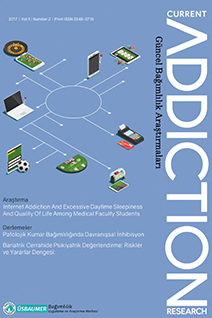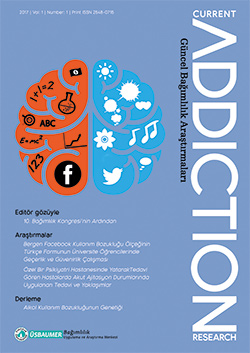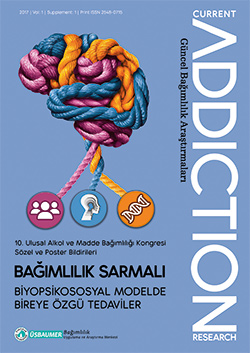Years
2025
2024
2023
2022
2021
2020
2019
2018
2017
Categories
Authors
- ALEJANDRO BORREGO-RUIZ (1)
- Abdullah TÜRKMEN (1)
- Ali Yasin Kafes (1)
- Aslı Zeynep Başabak Bhais (1)
- Aybüke Kaplan (1)
- Birgül CUMURCU Hatice (1)
- Burcu YÜCETÜRK (1)
- Caner ASLAN (1)
- Cemal Onur NOYAN (1)
- Ceyda ŞİŞMAN ÜNLÜ (1)
- DURMUŞ ELİF (1)
- Duygu KILIÇ ÖZTAN (1)
- EMLU HAKAN (1)
- Eda Deligöz (1)
- FİDAN ENİSE KÜBRA (1)
- Gökben Hızlı Sayar (2)
- Gül ERYILMAZ (1)
- Gül Eryılmaz (1)
- Gürler GÜZ (1)
- Gürler Güz (1)
- Hasan Kaya (1)
- Hatice Özyıldız Güz (1)
- Işıl Göğcegöz (1)
- KABA AYŞE (1)
- KABA FATİH (1)
- KARABURUN MERVE (1)
- Mustafa AKAN (1)
- Nesrin Dilbaz (2)
- Rüstem Mustafaoğlu (1)
- Sedef KOÇ BAL (1)
- Selami Ülker (1)
- Sever Yıldırım (1)
- Simge ALEVSAÇANLAR CÜCÜ (2)
- Tijen ŞENGEZER (1)
- Türker Tekin Ergüzel (1)
- Zakirov Fagan (1)
- Çetin Alptekin (1)
- ÖZKAN EZGİ (1)
- Özlem Bolat Kaya (1)
ARTICLES
Review Article
Abdullah TÜRKMEN
2025, 9(1), s:31-52
In recent years, addiction research has emphasized that substance use behavior should not be understood solely through biological mechanisms, but rather through multidimensional frameworks that include psychosocial and cultural variables. The aim of this review study is to comparatively examine the impact of addiction theories on Turkish individuals living in Turkey and Europe, with attention to their sociocultural contexts. The study was designed as a qualitative meta-analysis, and a systematic review of publications from 2010 to 2025 was conducted using databases including ULAKBİM, DergiPark, Scopus, and Web of Science. Selected studies were analyzed through theoretical frameworks such as Cognitive Behavioral Therapy (CBT), Social Learning Theory (SLT), psychodynamic, and biological models. Thematic analysis indicated that addiction in Turkey is primarily shaped by cultural norms and social learning processes, whereas Turkish immigrants in Europe are more affected by factors like discrimination, language barriers, and identity conflicts. Group therapy and culturally adapted interventions have been found to offer sensitive and effective responses to these challenges. The findings underscore the necessity of developing culturally sensitive clinical models that integrate dynamics of identity, belonging, and social exclusion.
Review Article
Substance Addiction In Adolescents And The Role Of The Family: A Mini Review
ÖZKAN EZGİ,KARABURUN MERVE,KABA AYŞE,DURMUŞ ELİF,EMLU HAKAN,KABA FATİH,FİDAN ENİSE KÜBRA
2024, 8(2), s:5-9
Substance addiction is one of the important problems threatening society today. Although it causes negative consequences in the person's life, it makes the process more dangerous as the person develops tolerance and desires the substance more. Adolescence is considered a risky period in substance addiction, where psychological, sociocultural and genetic factors play a role, and many factors such as the biological, psychological and environmental conditions of the adolescent determine the development processes of substance addiction. At this point, the family plays a role in the child's social and cognitive development and is seen as an important factor in the process of developing substance addiction. Lack of family functionality can lead to aggression and anti-social behavior disorder, and as a result, delinquency and substance use behaviors may occur in the adolescent. In this study, the role of the family in adolescents' development of substance addiction will be discussed.
Review Article
A holistic review of fentanyl use and its impact on public health
ALEJANDRO BORREGO-RUIZ
2024, 8(2), s:23-33
Fentanyl is a synthetic opioid that was engineered to provide a potent analgesic effect, with its medical utility widely established in clinical contexts such as pain management and anesthesia. Fentanyl use has become a critical public health issue due to diversion for misuse and to rapidly proliferation of illicit manufacturing. This persistent increase in illicitly manufactured fentanyl distribution shows no indication of decline, raising significant concerns regarding its impact on public health and opioid misuse trends, including a dramatic increase in overdose deaths. Moreover, individuals from socially or economically precarious backgrounds, as well as those suffering from mental health disorders, are particularly vulnerable, as limited access to resources and support systems can lead to increased substance use as a coping mechanism for stress and adversity. Therefore, the objective of this narrative review is to provide a holistic overview on fentanyl, addressing its synthesis process, pharmacology and clinical use, relationship with gut microbiome, epidemiology and global distribution, patterns of use and motivations, and overdose treatment. For this purpose, current and relevant evidence on fentanyl and its correlates has been conscientiously assessed and outlined.
Review Article
Ceyda ŞİŞMAN ÜNLÜ,Cemal Onur NOYAN
2024, 8(1), s:20-27
Gambling Disorder is a clinical picture characterized by repetitive and persistent gambling behavior. Gambling Disorder is the first and only non-substance-related behavioral addiction in the DSM-5 due to its neurobiological and clinical commonalities with alcohol and substance use disorders. When we examine Gambling Disorder from a neurobiological and neurocognitive perspective, neurotransmitters such as dopamine, serotonin, norepinephrine and glutamate are thought to be effective in the development of the disease. From a neurocognitive perspective, Gambling Disorder is based on behavioral conditioning with positive reinforcers, value attribution, impulsivity and impairments in decision-making processes. If an individual adopts gambling behavior as a coping mechanism for negative life events, this behavior continues to increase over time. Increasing gambling behavior over time weakens the individual's self-control capacity and leads to the continuation of gambling behavior despite the negative consequences. This vicious cycle contributes to the exacerbation of the disorder by causing problems in work, family, academic and social areas. Gambling Disorder, although initially a seemingly harmless behavior, can turn into addiction depending on the balance of underlying predisposing and protective factors.
Review Article
Psychology-Related Factors Of Internet Addiction: Literature Review
Eda Deligöz
2024, 8(1), s:28-33
Review Article
Self-Help Groups: Their Role In Addıction Treatment
Simge ALEVSAÇANLAR CÜCÜ
2023, 7(2), s:19-25
Self-help groups are organizations where individuals with common concerns, issues, or struggles come together to share their experiences and provide support to each other. These groups can address a variety of challenges such as addiction, mental health issues, health problems, grief, divorce, and other difficulties in life. There are numerous studies worldwide, including in our country, demonstrating the effectiveness of self-help groups in addiction treatment, such as Alcoholics Anonymous and Narcotics Anonymous. This study aims to understand the functions of self-help groups and their significance and role in addiction treatment.
Review Article
Addiction and Emotion-Focused Couple Therapy
Gül ERYILMAZ,Burcu YÜCETÜRK
2023, 7(2), s:26-35
Dependence; It is a disease with biological, psychological and social aspects. Especially the deterioration in family function has caused this disease to be considered as a family disease at the same time. These families need help and counseling in social relations, communication, economic problems, domestic violence and negative emotions. In this review article, emotion-focused couple therapy practices in the spouse problems of addicted patients are summarized.
Review Article
Çetin Alptekin,Zakirov Fagan
2023, 7(1), s:5-8
Rehabilitation includes the destruction of the behavioral patterns brought about by addiction and their replacement with new behavioral patterns, starting to establish relationships with other people in the environment in which they live and establishing new forms of relationships, and reorganizing family and environmental relations that have been disrupted during the period of substance use. Since alcohol and substance use disorder is a complex picture that causes many biopsychosocial problems, the treatment of individuals consists of medical treatment, psycho-social treatment and social rehabilitation programs. Social rehabilitation programs are very important in order to reintegrate individuals with alcohol and substance use disorders into society and to ensure their social functionality.
Review Article
Sedef KOÇ BAL,Gürler GÜZ,Duygu KILIÇ ÖZTAN
2022, 6(2), s:5-11
Review Article
Aslı Zeynep Başabak Bhais
2022, 6(2), s:12-16



 2. Sayı
2. Sayı
 1. Sayı
1. Sayı
 Ek Sayı
Ek Sayı







